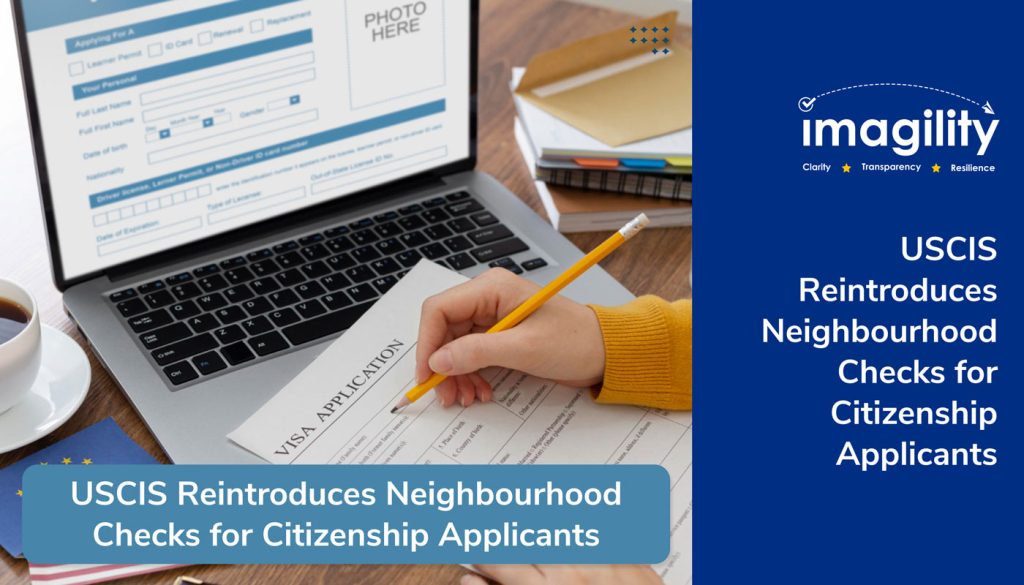U.S. Citizenship and Immigration Services (USCIS) has announced that it is resuming personal neighborhood investigations for individuals applying for U.S. naturalization. This marks the return of a practice that has not been widely used since the early 1990s and was last formally carried out under President George H.W. Bush’s administration.
According to a new policy memorandum, these investigations will serve as an added step to ensure that applicants meet the legal requirements for citizenship, particularly in areas such as good moral character, attachment to the U.S. Constitution, and commitment to the principles of American society.
In this blog, we will explain what neighborhood investigations actually involve, why USCIS has reintroduced them, their impact on citizenship applicants, and how Imagility helps attorneys prepare stronger, well-documented naturalization applications.
Here we go!
What Are Neighborhood Investigations?
Neighborhood investigations are background checks that go beyond standard biometric and FBI screenings. They may involve:
- Interviews with neighbors to confirm an applicant’s character and residency.
- Verification of employment history covering at least the five years prior to the naturalization application.
- Character assessments to determine if the applicant has been living in a manner consistent with the values and responsibilities of U.S. citizenship.
These investigations are not new. In fact, similar checks have been conducted as far back as 1802. Until 1981, naturalization applicants were even required to present two witnesses to vouch for their character. While the witness requirement was removed, USCIS retained the authority under INA Section 335(a) to conduct investigations when needed.
Why Is USCIS Bringing Them Back?
The memo highlights that U.S. citizenship carries significant rights and responsibilities, making it essential that only qualified applicants are approved. While USCIS has generally relied on FBI criminal background checks in recent decades, officials now believe that neighborhood investigations can provide a fuller picture of an applicant’s character, loyalty, and constitutional attachment.
Joseph Edlow, USCIS Deputy Director for Policy, emphasized that the agency must ensure “only the most qualified applicants receive American citizenship” and that the public can trust the integrity of the process.
The Evolution of Naturalization Vetting
The process of verifying an applicant’s eligibility for U.S. citizenship has gone through several shifts over the nation’s history. In the early 1800s, individuals seeking naturalization had to present two witnesses who could personally vouch for their character and loyalty to the United States.
This requirement remained in place for nearly 180 years until 1981, when Congress eliminated it, reasoning that a petitioner’s background and character could be assessed more effectively through official investigations.
By the 1990s, neighborhood investigations had mostly disappeared, replaced by reliance on biometric data and FBI background checks. With the new USCIS policy, the pendulum swings back, reintroducing face-to-face neighborhood inquiries that echo older traditions of community-based vetting, but under modern standards of scrutiny.
What Does This Mean for Citizenship Applicants?
If you are planning to apply for U.S. naturalization, here’s what you need to know about the new process:
- Be prepared for additional scrutiny – USCIS may reach out to your neighbors, employers, or colleagues.
- Document your history – Employment records, community involvement, and testimonial letters may help demonstrate your eligibility.
- Good moral character matters – USCIS will be closely evaluating whether your lifestyle and conduct reflect the values of American citizenship.
- Proactive submissions may help – Applicants may provide evidence such as reference letters upfront, potentially reducing the need for a full investigation.
A Renewed Focus on Trust in the Citizenship Process
USCIS’s move to bring back neighborhood checks signals a renewed effort to strengthen public trust in the naturalization system. Citizenship is not just about paperwork and passing tests. It is about proving long-term commitment to American values, communities, and responsibilities.
For applicants, this means the process may feel more personal than before. Beyond criminal record checks, USCIS is now looking at how individuals live, work, and integrate into U.S. society. While this could add another layer of review, it also indicates the government’s belief that citizenship must reflect integrity, loyalty, and readiness to embrace American life.
How Imagility Helps Attorneys Manage Citizenship Applications
With USCIS reviving neighborhood investigations, attorneys filing naturalization petitions must prepare stronger, evidence-backed applications for their clients. This means being organized, transparent, and ready to demonstrate good moral character through supporting documents.
Imagility, an AI-enabled immigration platform, simplifies this process for attorneys through:
AI and Automation:
Smart workflows guide attorneys through every step of the N-400 process, highlighting missing information and automating repetitive tasks like form filling and document tracking.
- Significant Time Savings:
By reducing manual data entry and automating compliance checks, attorneys save valuable hours.
- Enhanced Client Communication:
Secure portals allow attorneys to request documents, share updates, and communicate directly with clients, keeping them informed and reducing back-and-forth confusion.
- Centralized Document Management:
Easily collect, store, and organize clients employment records, community involvement proof, and reference letters.
- Reduced Risk of Errors:
Automated checks ensure applications are accurate and complete before submission, lowering the chances of delays or Request For Evidence (RFEs).
For attorneys, Imagility transforms the naturalization process into a more efficient, collaborative, and seamless experience, helping them better serve clients while staying ahead of USCIS’s heightened scrutiny.
Final Thoughts
The return of neighborhood investigations marks a significant shift in the naturalization process. While the policy aims to ensure that citizenship applicants fully meet the legal requirements, it also introduces additional steps that may feel more personal and demanding.
Applicants should ensure their applications are complete, accurate, and supported by evidence of their good moral character and commitment to the United States. By doing so, you can be better prepared for the possibility of a neighborhood investigation as part of your citizenship journey.










